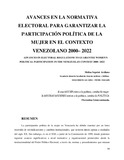Mostrar el registro sencillo del ítem
Avances en la normativa electoral para garantizar la participación política de la mujer en el contexto venezolano 2000– 2022
| dc.rights.license | http://creativecommons.org/licenses/by-nc-sa/3.0/ve/ | es_VE |
| dc.contributor.author | Segnini Arellano, Melisa | |
| dc.date.accessioned | 2024-01-29T21:59:42Z | |
| dc.date.available | 2024-01-29T21:59:42Z | |
| dc.date.issued | 2024-01-29 | |
| dc.identifier.issn | 1317-9535 | es_VE |
| dc.identifier.uri | http://www.saber.ula.ve/handle/123456789/50181 | |
| dc.description.abstract | La participación política de la mujer en Venezuela ha debido transitar por un lento recorrido de reivindicaciones y cambios institucionales, que tuvieron inicio apenas a mediados del siglo XX. Sin embargo, es en el XXI, a partir de la Constitución de 1999, donde podemos registrar avances significativos a nivel normativo y organizacional promovidos desde la institucionalidad del Poder Público Electoral, a través de, normas y procedimientos que emanan de esta misma estructura organizativa y permiten evidenciar el fortalecimiento del sufragio pasivo desde los principios de equidad de género y de igualdad oportunidades. Pese a no haber alcanzado el nivel esperado de representación de la mujer, se considera un avance normativo que ha permitido generar una nueva cultura política y la participación activa de la mujer en los espacios de poder. | es_VE |
| dc.language.iso | es | es_VE |
| dc.rights | info:eu-repo/semantics/openAccess | es_VE |
| dc.subject | Participación Política | es_VE |
| dc.subject | Sufragio Pasivo | es_VE |
| dc.subject | Paridad | es_VE |
| dc.subject | equidad de género | es_VE |
| dc.subject | mujer | es_VE |
| dc.title | Avances en la normativa electoral para garantizar la participación política de la mujer en el contexto venezolano 2000– 2022 | es_VE |
| dc.title.alternative | Advances in electoral regulations to guarantee women's political participation in the venezuelan context 2000- 2022 | es_VE |
| dc.type | info:eu-repo/semantics/article | es_VE |
| dc.description.abstract1 | Women’s political participation in Venezuela has gone through a slow process of demands and institutional changes, which began only in the middle of the twentieth century. However, it is in the XXI, starting with the 1999 Constitution, that we can record significant advances at the normative and organizational level promoted by the institutions of the Electoral Public Power, through, rules and procedures that emanate from this same organizational structure and allow evidence of the strengthening of suffrage from the principles of gender equity and equal opportunities. Despite not having reached the expected level of representation of women, it is considered a normative advance that has generated a new political culture and the active participation of women in the spaces of power. | es_VE |
| dc.description.colacion | 66-89 | es_VE |
| dc.description.email | cieprol@ula.ve | es_VE |
| dc.description.frecuencia | Semestral | es_VE |
| dc.publisher.pais | Venezuela | es_VE |
| dc.subject.centroinvestigacion | Centro Iberoamericano de Estudios Provinciales y Locales (CIEPROL) | es_VE |
| dc.subject.facultad | Facultad de Ciencias Jurídicas y Políticas | es_VE |
| dc.subject.institucion | Universidad de Los Andes | es_VE |
| dc.subject.keywords | Political participation | es_VE |
| dc.subject.keywords | Passive Suffrage | es_VE |
| dc.subject.keywords | Parity | es_VE |
| dc.subject.keywords | gender equity | es_VE |
| dc.subject.keywords | women | es_VE |
| dc.subject.publicacionelectronica | Provincia | es_VE |
| dc.subject.seccion | Revista Provincia: Artículos | es_VE |
| dc.subject.tipo | Revistas | es_VE |
| dc.type.media | Texto | es_VE |


